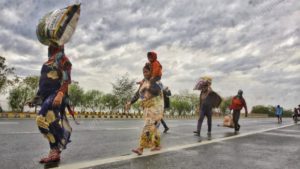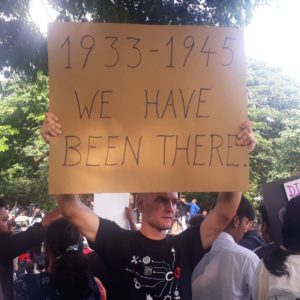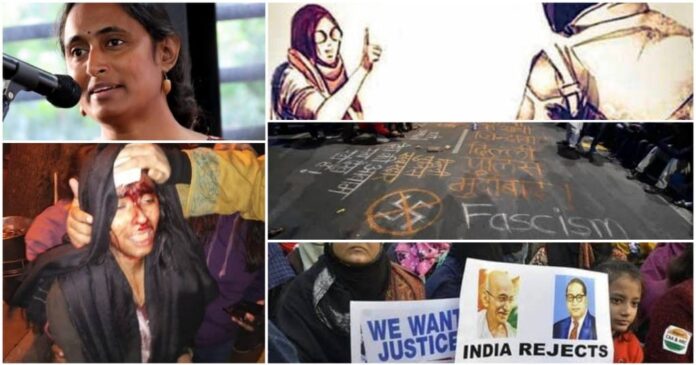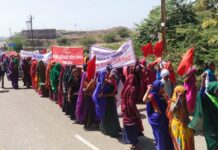For the past several years, it has felt as though every battle is a losing battle. India is ruled by a regime that is waging war on every vestige of democracy. Kashmir has been caged, gagged, and muzzled. Universities face a daily onslaught – physical and ideological. Dread in the pit of one’s stomach – about Muslim minorities being killed, friends and comrades being jailed or worse – has become a familiar sensation. Gauri Lankesh was killed: and we keep wondering which friend will be next. It is impossible to watch television news any more – the choice there is between unrelenting Islamophobic and anti-democratic poison and liberal “both sides” pusillanimity.
 The coronavirus crisis has, as Arundhati Roy observed, served as an x-ray for our society. Our rulers met the health crisis with the same cruelty and callousness that they bring to all other issues. They tried to spread Islamophobia and blame the virus on Muslims. They reached out to the old template of untouchability to treat Dalit sanitation workers, and also doctors, nurses, health workers during the pandemic. And they extended the untouchability template to Muslims, subjecting them to social boycotts. Migrant workers were subjected to unspeakable cruelty: forced to walk hundreds of kilometers to get home, dodging the police who would mete out beatings to them for “violating the lockdown”.
The coronavirus crisis has, as Arundhati Roy observed, served as an x-ray for our society. Our rulers met the health crisis with the same cruelty and callousness that they bring to all other issues. They tried to spread Islamophobia and blame the virus on Muslims. They reached out to the old template of untouchability to treat Dalit sanitation workers, and also doctors, nurses, health workers during the pandemic. And they extended the untouchability template to Muslims, subjecting them to social boycotts. Migrant workers were subjected to unspeakable cruelty: forced to walk hundreds of kilometers to get home, dodging the police who would mete out beatings to them for “violating the lockdown”.
Our public health systems are weak, private hospitals are trying to make a killing offering healthcare at a steep price, even as most of India’s citizens have no access to the most basic means of hygiene and safety.
The lockdown is now in unlock mode, but democracy is still locked down. Protests are forbidden. But during the lockdown, activists and intellectuals and students continue to be arrested and jailed. The Bhima Koregaon case, and now the Delhi pogrom against Muslims, are being used as pretexts to arrest innocent activists under the draconian UAPA and jail them without bail and without trial.
In the mind game that the fascists play with us, they jeer at our utter irrelevance and triumphantly flaunt their victory over democratic values. In such times, despair is tempting and even comforting. Many have found it easy to “give up” on India’s people, to say “India is irredeemably communal, casteist, patriarchal” and the fascist Hindu Nation was inevitable for the past century. While the impulse to “give up” on our people is tempting, I also think it is lazy and politically defeatist. And defeatism is a luxury we cannot afford. Berating Modi voters, and the country itself as immoral and fascist is inaccurate and politically unsound.
Related Read: Why the Right is Winning: Shiv Visvanathan
People hold contradictory forms of consciousness – multiple versions of themselves. Hindutva politics calls out to people to identify as Hindus, defining “Hindu” identity as hatred for Muslims and other minorities, and pride in Brahminical patriarchy. It asks people to identify as loyal subjects of a benign, all-powerful state – and to view dissent against the state as disloyalty to the country. Left movements and other people’s movements call out to people to identify as workers or peasants, as women, as Dalits, as Indians committed to transforming India by challenging its oppressive structures and ideologies. These movements ask Indians to be the best version of themselves, as individuals but especially as collectives.
In these times of profound failure, then, what is the best posture for anti-fascists to adopt? The first step must probably be to resist self-congratulation, and admit that right now, the enemy is winning. Next, we should avoid despair and its comforts – that sweet ache like worrying a wobbly tooth. Resist the temptation to say, as a friend and very fine activist once did to me, “logon mein hi locha hai” (the fault/flaw lies in people). We can’t afford petulance, can’t stamp our feet in disgust at the “bigoted multitudes” who voted Modi and deserve what they get. Instead, we need to invite ourselves, and all our fellow fighters to summon up greater empathy for those who don’t share our sense of urgency about the rise of fascism in India.

I spent a good part of February in Bihar, campaigning against the CAA, NPR and NRC. We campaigned mainly amongst non Muslims, who had tended to accept the BJP propaganda that only Muslims need fear this corpus of policies. The campaign had a considerable degree of success. Nationwide, too, the Government propaganda over NPR, NRC and CAA has not got the success it hoped for. The government has been forced to take a step back – dilute NPR and put NRC on the back burner, in order to save the CAA.
I also took time to speak at some of the Shaheen Baghs in Bihar. In conversations, I would hear the question, “We Muslims are out here protesting. But why are so few Hindus joining us?” I asked them to approach the problem differently. When Dalits or Adivasis or landless workers held protests on “their” concerns, how often did we join them, I asked. Was it any surprise that they too do not join this protest when they think they may not be directly affected by the new citizenship measures? Instead of berating Hindus for staying away, it is on us to reach out to all sections of vulnerable Indians. We can ask them what their concerns are, offer solidarity and support them and also explain how the CAA NPR NRC threatens to disenfranchise Muslim Indians and dangle the Damocles sword of “Doubtful voter” status on all other Indians, effectively putting us all at the mercy of the State and the ruling party. Empathy and solidarity are infectious.
So in effect, the posture I find useful, effective, and ethical is not one of a brave lonely voice of sanity going down fighting even as they are betrayed by foolish masses. This posture, I would venture to say, is elitist and fundamentally undemocratic even when adopted by the victims of fascism who may indeed be fighting a lonely battle right now.
Instead, we need a posture of openness and empathy, believing that even those who may possibly have voted for the BJP, or who may not have felt the need to join the protests yet, have a capacity for openness and empathy. We need to find ways to call out to that capacity in ourselves and in everyone else.

I will end with a passage from an essay titled “The Urgent Relevance of Hannah Arendt” (Richard J Bernstein, philosophermag.com) – a passage that serves as a sort of mantra for me these days:
“The deepest theme in Arendt is the need to take responsibility for our political lives. She warned against being seduced by nihilism, cynicism, or indifference. She resisted false hope and false despair. She was bold in describing the darkness of our times – lying, deception, self-deception, image-making, and the attempt to destroy the very distinction between truth and falsehood.”
The bravest and best of us need to resist false hope and false despair, refuse to be seduced by nihilism and cynicism. We need to gently remind ourselves to put in the hard work of empathy and openness, of working to build the solidarities we need, rather than succumbing to angry, petulant despair.
Kavita Krishnan, CPIML Liberation Politburo member, AIPWA Secretary
(This is an updated version of a write up originally written in March in English for Aroop magazine, for an issue themed “Failure”).




























